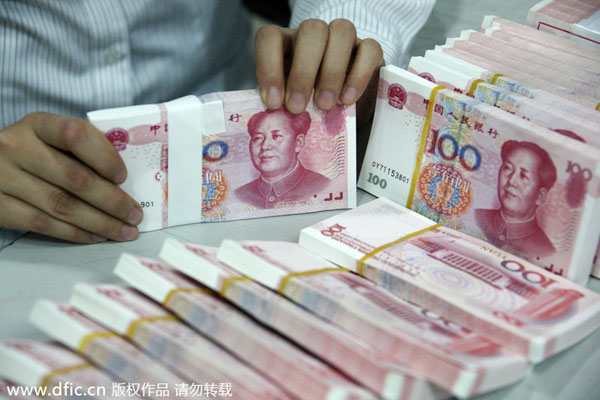 |
|
A clerk counts yuan bills at a bank in Huaibei, East China's Anhui province. [Photo/IC] |
The comments by Standard & Poor's Ratings Services came close on the heels of the Fifth Plenum drawing up the growth target during the 13th Five-Year Plan (2016-20). Though the specific growth target has not yet been disclosed, analysts expect it to be a minimum 6.5 percent growth during the period to attain the goal of doubling GDP during 2010-20.
That is significantly higher than S&P's prediction: Under its baseline scenario, China's potential GDP growth in 2016 and 2017 is 6.3 percent and 6.1 percent, respectively; the downside scenario even suggested growth rate could dip to 5.3 and 5.1 percent in 2016 and 2017, respectively.
"Any overestimation may lead to stronger demand for local government-led investment than is necessary in order to meet the targets. Such a scenario would also entail regulatory forbearance over local government borrowing for longer than we currently expect," said Kim Eng Tan, a senior director of the firm's sovereign and international public finance ratings department.
S&P warned that under the downside scenario, it is most likely to cut ratings by up to two notches for China's building materials, real estate developers, metal and mining and transport industries. It is also likely to cut ratings by one notch for the nation's oil and gas, engineering and construction, and capital goods sectors.
"Heavy industries and asset-heavy sectors are particularly vulnerable because they have high operating leverage and are also fairly indebted. Asset-light sectors such as engineering and construction will still suffer as their order books shrink," said Lawrence Lu, a senior director with S&P corporate ratings department.
By the end of 2014, regional and local government borrowing had reached 24 trillion yuan ($3.7 trillion), or 38 percent of the country's GDP in 2014, according to the government's update in August. That represented a 34 percent increase over the figures from 18 months earlier.
Rising debt levels have weakened governments' credit profiles, leaving them exposed to the effects of China's slowing economy and the related weakening in revenues, amid falling land sales.
"In a scenario where the Chinese government overestimates potential GDP growth, which is likely, we see a marked risk that the debt burden won't stabilize within the next three years," S&P said in a previous report.
To ease local governments' borrowing requirements, S&P suggested they tap into cash reserves. As of the end of September, banks had 4.1 trillion yuan of "fiscal deposits", according to the central bank.
These deposits were mostly related to local governments and under the control of fiscal authorities. The deposits were equivalent to 30 percent of China's general budgetary spending in 2014 and 500 billion yuan higher than a year earlier, which suggested they had been largely untapped.
